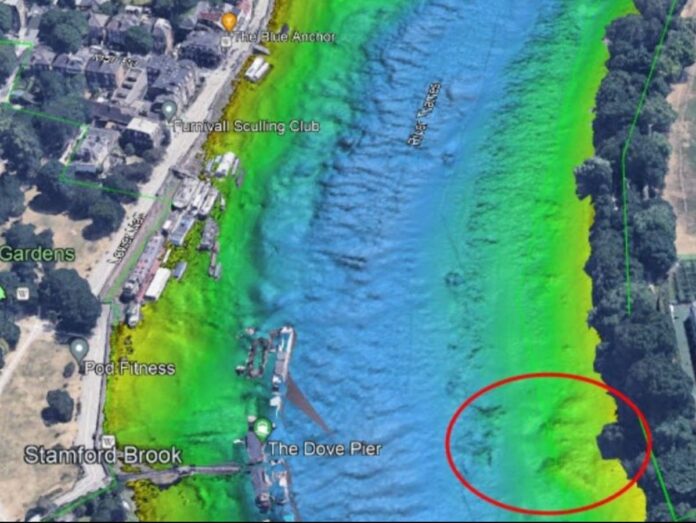
An “island” of discarded wet wipes spanning the size of two tennis courts has formed on the banks of the River Thames in west London.
The huge blockage near Hammersmith is worsening by the day, and the situation has become so bad that it has spurred MPs to advise people against flushing the wipes down the toilet.
Wet wipes make up about 90 per cent of “fatbergs” – huge masses of congealed household waste, grease, and plastic – that block the sewage system.
The mound is located on the bank near Barnes, in the section of the Thames that runs through Hammersmith, laser images from charity Thames 21 released last year show.
Putney Labour MP Fleur Anderson has called for an outright ban on making the wipes with plastic materials, by tabling a draft Bill in the House of Commons last year.
Scan showing the size of the fatberg
(Thames 21)
Speaking during a session of questions on the environment, food and rural affairs on Thursday she said: “There’s a lack of awareness that flushing them down, they don’t disintegrate, they do stay in the system for a long time.
“They do go out to the sea, they go on the banks of the Thames.
“There’s an island the size of two tennis courts and I’ve been and stood on it – it’s near Hammersmith Bridge in the Thames and it’s a metre deep or more in places of just wet wipes.
“It’s actually changed the course of the Thames.”
Ms Anderson advised the government to “move ahead” with its proposed ban on plastic in wet wipes, following a consultation which ended in February.
On the proposed ban, environment minister Rebecca Pow said people should not use a wet wipe if they don’t have to, adding that the wipes should not be “chucked down the loo”.
In February, a Thames Water survey revealed that two in five people admitted to flushing wet wipes and other sanitary products down the toilet.
Anna Boyles, Thames Water’s operations manager, said: “We know many busy families love the convenience of wet wipes, but most are made from plastic and can take centuries to biodegrade. It’s like flushing a plastic bag down the loo.
“Some wipes are marketed as ‘flushable’. All that means is that they will disappear down the u-bend, but they’re not gone for good and could end up clogging your pipes or in the river.”
Ms Boyles also said: “We’re working to influence manufacturers to properly label their products and, even better, to remove the plastic from the wipes altogether. If you’re using standard wet wipes, please pop them in the bin instead of the toilet.
“We’re also working with the government, Ofwat and the Environment Agency to accelerate work to stop these unacceptable discharges of untreated sewage and sewage litter from happening in the first place.”















